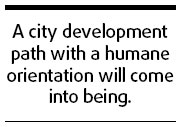(The author is a researcher with China Foundation for International and Strategic Studies)
It is universally recognized that holding an Olympic Games can greatly step up the modernization process of the host city. Over the past seven years since it won the qualification for the hosting of the 29th Summer Olympics, Beijing has made a big stride forward in its transformation into an international metropolis. Some media reports have even called its infrastructure development over the past seven years as the most marvelous city reconstruction in China's modern and contemporary history.
The great changes the ancient Chinese capital has experienced have been embodied not only in the scale and speed of its facility construction and reinforcement, but more particularly, in its city development concept.
To hold a high-level Olympics Games, Beijing should, in accordance with the requirements of the International Olympic Committee (IOC), make all-round efforts to improve its city management, infrastructure, sport venue construction and environmental protection to fulfill its numerous commitments made to the IOC. It is expected that such kinds of all-round improvements will certainly result in the upgrading of the long-held city concepts of social life, its administrative functions, development layout and architectural style. This should appeal to not only top decision-makers but also to ordinary people.

Olympic preparations have made the Chinese people re-establish their concept of city modernization. Beijing has promised to offer the world a "high-tech, people's and green" Olympics. Such a commitment is exactly the basic element a modern metropolis should bear. As early as in the middle of last century, knowledge, humanism and ecology became a principle in urbanization in developed countries.
With the dawn of economic globalization and the strengthening of regional cooperation in the latter part of the 20th century, a modern metropolis should bear both international and regional characters. The establishment of the "high-tech Olympics, people's Olympics and green Olympic" concept by Chinese decision-makers has fully testified that China's urbanization has been exactly in tune with the worldwide thinking on modern city development.
After the opening ceremony of the Beijing Olympics, some Western journalists asked officials of the Ministry of Housing and Urban-Rural Construction and the Ministry of Environmental Protection about the country's "Olympic concept". All the answers they got were the same: that the "high-tech, people's and green Olympic" concept will not only apply to Beijing during the period of the Games, but will also apply to the development strategy for the capital and even other cities nationwide in the future. There are reasons to believe that a country devoted to stepping up urbanization will hold on to the new concept and also practice it in city development in the future.
Preparations for the world's largest sport carnival in the past years have also made Chinese people ponder over the country's urbanization path. A review of the urbanization in developed countries will find almost all these countries have basically experienced two phases in this process: centralization and decentralization. In the first phase, cities saw a high degree of population concentration, multiple functions and capital convergence. But as the cost of enjoying these conveniences, city dwellers should also endure a series of problems caused by the shortage of land, traffic congestion, pollution, and deteriorating social order. In the second phase - decentralization - the cities experienced an obvious suburban urbanization and the emerging of satellite cities as well as the movement of urban populations to suburban areas. This period witnessed the gradual narrowing and even the final disappearance of the gap in the production modes and living conditions between urban and rural residents. Such an outcome has long been the goal unremittingly pursued by the Chinese government in its efforts to narrow and finally eliminate the gap between rural and urban people.
In Beijing's preparations for the Olympics, a mountain of difficult problems the municipal government has encountered, such as its treatment of traffic and pollution issues, has hammered home the message that our country now is still in the first phase of city development, the one of centralization. How to reduce to minimum the maladies produced by centralization and strive for the coming of decentralization at an earlier time will no doubt be a goal the country's decision-makers should make efforts to reach.
The Olympic Games has also led Chinese people to understand the connection between the modern city development layout and spiritual lives of modern urban dwellers.
The reform and opening-up policy has laid a solid material foundation for Chinese people to improve their living conditions and environment, which, as an internal stimulus, has driven them to change the concept of city designing. The holding of the Olympics Games offers China good opportunities to absorb the world's most advanced concepts of city development.
It is the Olympics that inspires us Chinese people to consider, in our development of modern cities, how to effectively improve the spiritual state of city dwellers. In their preparations for the Olympics, the spiritual upgrading experienced by the Chinese people on the concept of modern city development will inevitably bring the country to a city development path with a humane orientation.